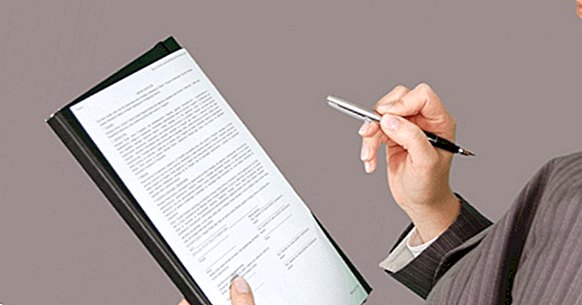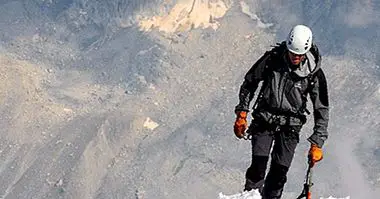Critical Incident Interview (EIB): what it is and how to use it
We live in a highly competitive world. We can see this fact in many aspects of life, one of them being the workplace. For each job offered we can find hundreds of people wishing to be selected, being necessary for employers to assess the suitability of each candidate to select those most capable of performing the roles of the position.
In this sense, there is the personal competence of each one, which can be assessed through methods such as the Critical Incident Interview, or Behavioral Event Interview .
The Critical Incident Interview
The Critical Incident Interview, also known by the acronym BEI by Behavioral Event Interview, is an interview technique devised by John C. Flanagan in 1954, which has been modified over time and is mainly used to achieve the goal. get an idea of the real skills of people .
It is defined as the set of processes used for the collection of observations of human behavior to facilitate the analysis of the utility of the individual's behavior and your mental capacity in solving practical problems .
This procedure can be used either in the form of a questionnaire that the subject can answer or directly during an interview, counting in the second case with the advantage of being able to directly observe the behavior and non-verbal language.
The form of interview used frequently was developed and popularized by Mc.Clelland , based on the assumption that the best predictor of a person's future performance in a specific task is the one he had in the past with similar tasks.
Its main use is in the selection of personnel , at the time of assessing the suitability of a candidate for a position, but techniques based on this type of interview in training, preparation and distribution of tasks in different areas can also be used.
- Related article: "Psychology of work and organizations: a profession with a future"
What is valued?
It is about assessing the level of performance of the candidate through a highly structured interview , through which the consistency of the displayed competences is valued.
The interviewer will ask the candidate to explain how he confronted a particular event in the past, this event being a real situation that has lived the candidate who has some kind of relationship with the position to which it applies. Not only the facts are valued (although the most important and fundamental thing is what the subject did), but that it is also requested that the thoughts and emotions be elicited that they awoke in the candidate. An explanation is requested, not an evaluation of what happened
It is important to make clear that what is valued are the facts, thoughts and attitudes that he or she showed, in the first person, not the performance of the company or company to which he belonged.
- Maybe you're interested: "The different types of interviews and their characteristics"
Objectives of the interview
Although the main objective of the interview of critical incidents is the obtaining of information regarding the past competence of the subjects in order to predict your future performance , said obtaining of information can be carried out for different purposes.
In the first place, as already indicated above, one of the purposes for which this type of interview is usually used is the realization of personnel selection processes. Based on the previous behavior and the lessons learned from it, it is possible to assess the existence of specific competences that may be useful (or, on the contrary, not very recommendable) to exercise the position in question.
Once inside the company, it can also be used to evaluate the performance of workers, in order to assess their capabilities and even assess the need for some type of training or training with workers.
Another possible application can be given in the world of marketing and market research, in order to assess the needs of the population based on the skills and experiences they manifest. For example, it can be used to identify the need for a specific service or product.
Aspects assessed
Throughout the process the interviewee will be asked to answer a series of questions. Although to take into account the situations that are going to be reported and from which competences are going to be inferred, open questions are generally used, closed and very specific questions can occasionally be used as an introduction to these aspects.
Some of the basic questions focus on visualizing a specific experience and asks how it happened, how that situation was arrived at, what the subject's role was or what final result it produced.
The aspects to assess in each interview will depend on the type of position offered and the roles and capacities required in it. However, there are a number of aspects that are usually valued in most interviews of this type. Below we present a few aspects and the type of questions that are usually used.
- Maybe you're interested: "10 keys to detect and retain talent in your company"
1. Sense of achievement
Those things that we are proud of they say a lot about our personality and our way of thinking . In addition, knowing how they have been achieved can be very valuable when predicting the direction that future decisions will take the individual. For example, a typical question could be. "Explain to me a situation or a result that you feel satisfied with and how you got there."
2. Group work
Group work is one of the fundamental pillars of most organizations and companies . Being able to organize, work with competent professionals in the same or other matters, accept other opinions and / or negotiate are essential elements today when offering a good service and maintaining high performance in a company. An example of questions of this type could be: "Do you like to work in a group? Tell me about a situation where you think collaboration with others has benefited you. "
3. Autonomy
Although this element seems to contradict the previous point, the truth is that although group work is essential, it is also necessary to be able to act without needing a continuous guide, especially when events occur that are beyond the forecasts. This does not mean that you do not consult others or that you do not report what you do, but rather not depend solely on external criteria to act . An example of a question: "Tell me what you did at a time when you had to act quickly in the face of an unforeseen event".
4. Influence
The ability to influence others, persuade them and / or make them see perspectives different from their own It is usually an element highly valued by various companies and companies that offer goods or services. An example of a typical question might be: "Describe me the last time you tried to convince someone of something".
5. Flexibility and adaptation to change
We live in a dynamic world in which things change constantly. Be able to adapt and open ourselves to new possibilities It is very helpful in most jobs. They could ask us something like: "What is the last thing you have had to adapt in your last job and how did you live it?".
6. Creativity and proactivity
The capacity of contribute something to the company It is usually an added value that companies value positively. Some typical questions would be: Are you considered an innovator? Tell me one time when you have caused an improvement in your job. "
Structure of the interview: Phases
The interview of critical incidents is a highly structured interview that follows a script prefixed by the company that performs, generally independent of the individual's response (although depending on the answer, questions could be added to deepen one of the aspects).
We can usually see that the Critical Incident Interview It is divided into three phases; welcome, development and closing .
1. Home
The first moment of the interview as such. The candidate is welcomed, an explanation of what is going to happen throughout the interview is offered, the approximate time that will last and it is assured that the content of said interview will be confidential. Also, the interviewer must try to make sure that you have no doubts about the procedure , leaving to express any initial doubt that the candidate may have.
2. Development
In this second phase, the data of the file and curriculum are analyzed first with the interviewee in order to have a better idea of the areas and aspects with which he is accustomed to deal with.
After this brief data check the interviewer proceeds to perform different types of open questions Regarding situations that the interviewee has spent throughout his life, focusing on the description of the facts, thoughts and emotions he had at the time. It should be made clear that a specific and not generic response is sought, and they do not value the reflections that the subject makes about it since what is to be evaluated is only the competence.
3. Closure
In the closing phase it is intended to recapitulate and make sure that you have all the necessary information, to finish providing information about the position, that the candidate can ask for those elements about which he has doubts , and indicate how the contact will be maintained in order to communicate the decision.
Advantages and disadvantages
The interview of critical incidents has multiple advantages over other types of evaluation , but also a series of drawbacks.
As a main advantage we can establish that it allows us to make a more or less clear idea of the ways of acting that the subject has had and the type of competences that it has, with which it allows predicting future performance with greater accuracy than a classic interview. In addition to it we work from situations that the subject has had in real life , not forcing him to imagine a strange situation. It is an economical and easily understandable methodology for both the interviewee and the interviewer.
However, as disadvantages, it should be mentioned that specific events may not be fully remembered by the subject , besides that this can falsify them. In addition, the fact that the situation is chosen by the interviewee means that there may be a certain lack of control in this regard and that moments are selected that are not fully representative of what is intended to be evaluated. Finally, personal experiences can be difficult for some people to count on, assuming for them an invasion of their privacy that can limit the answers given.



















